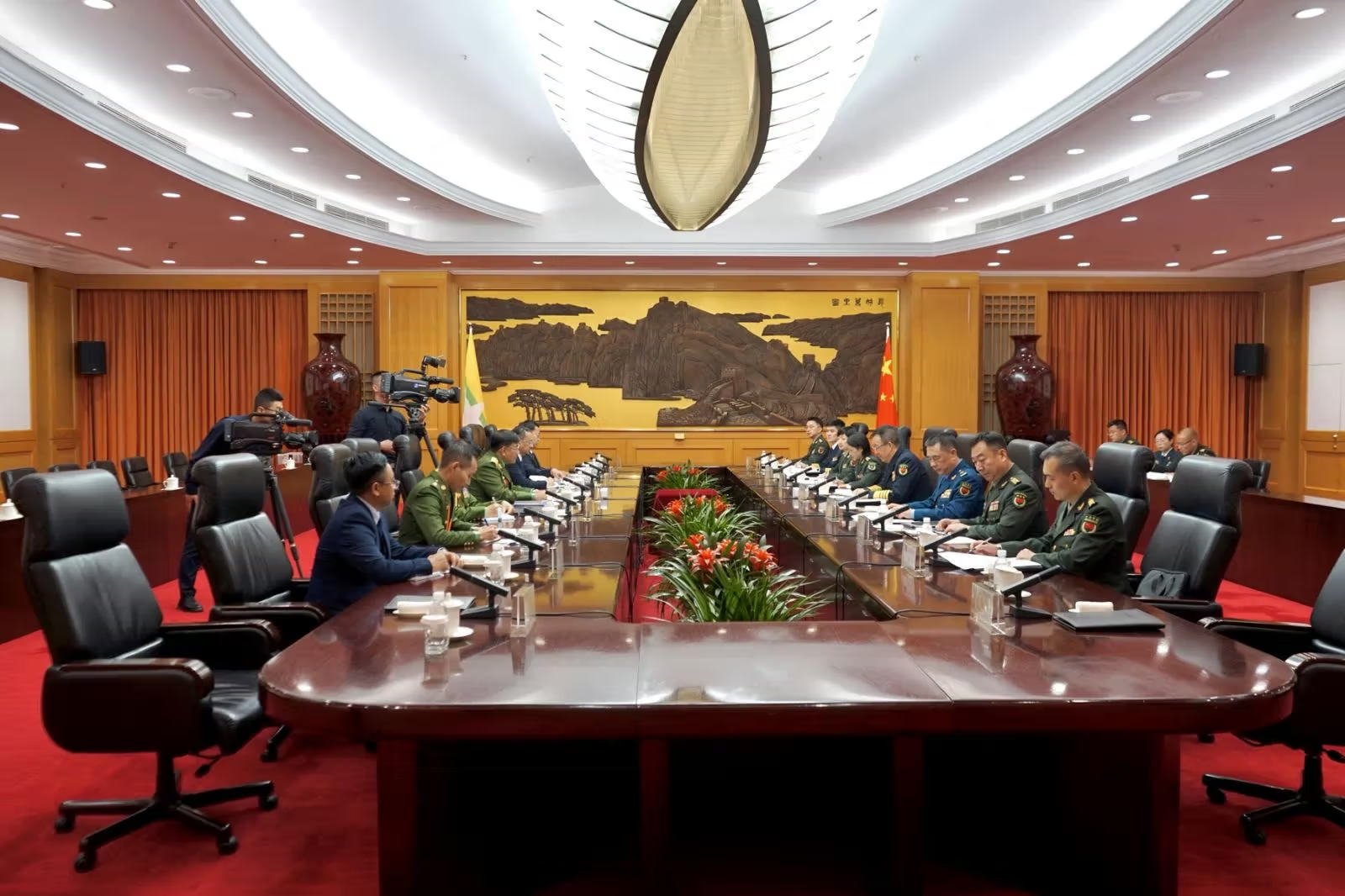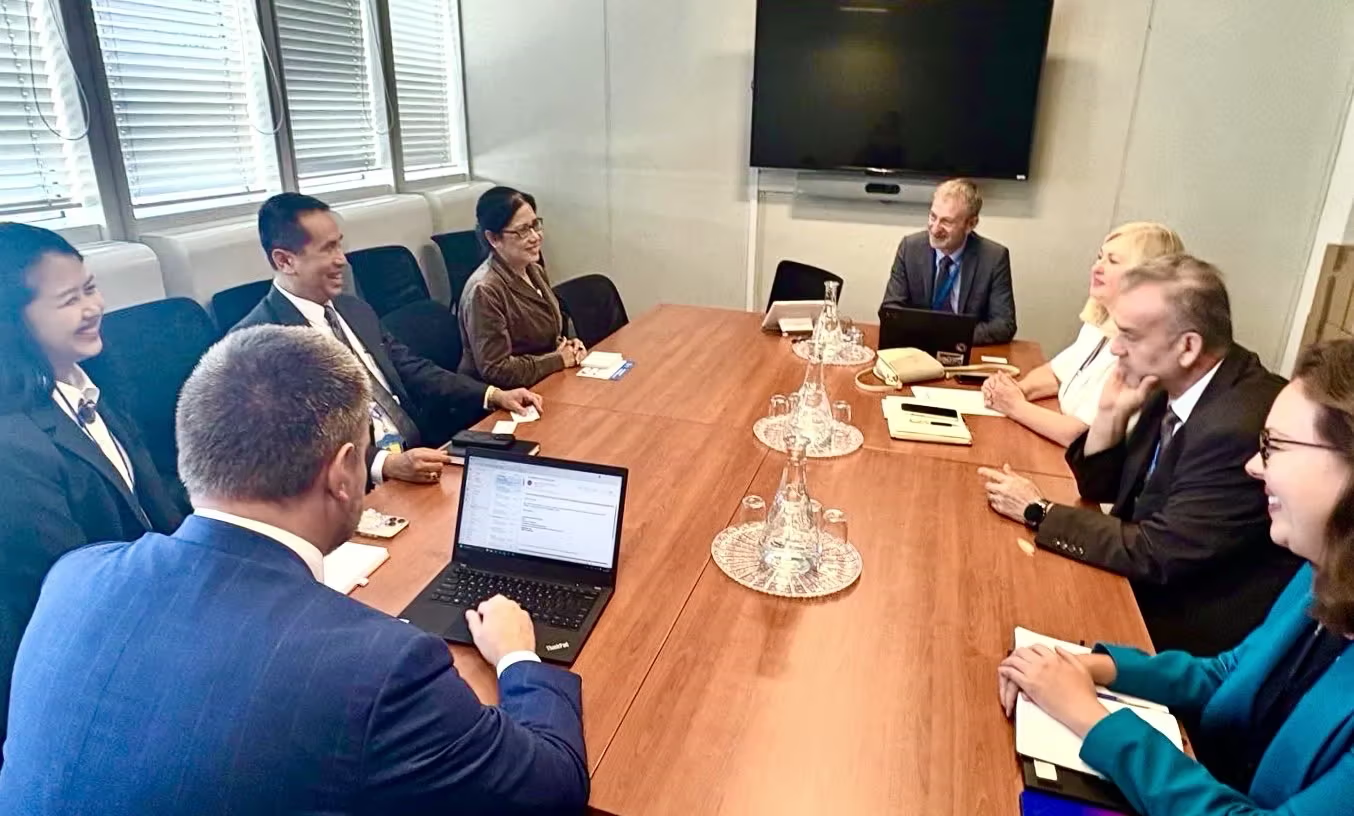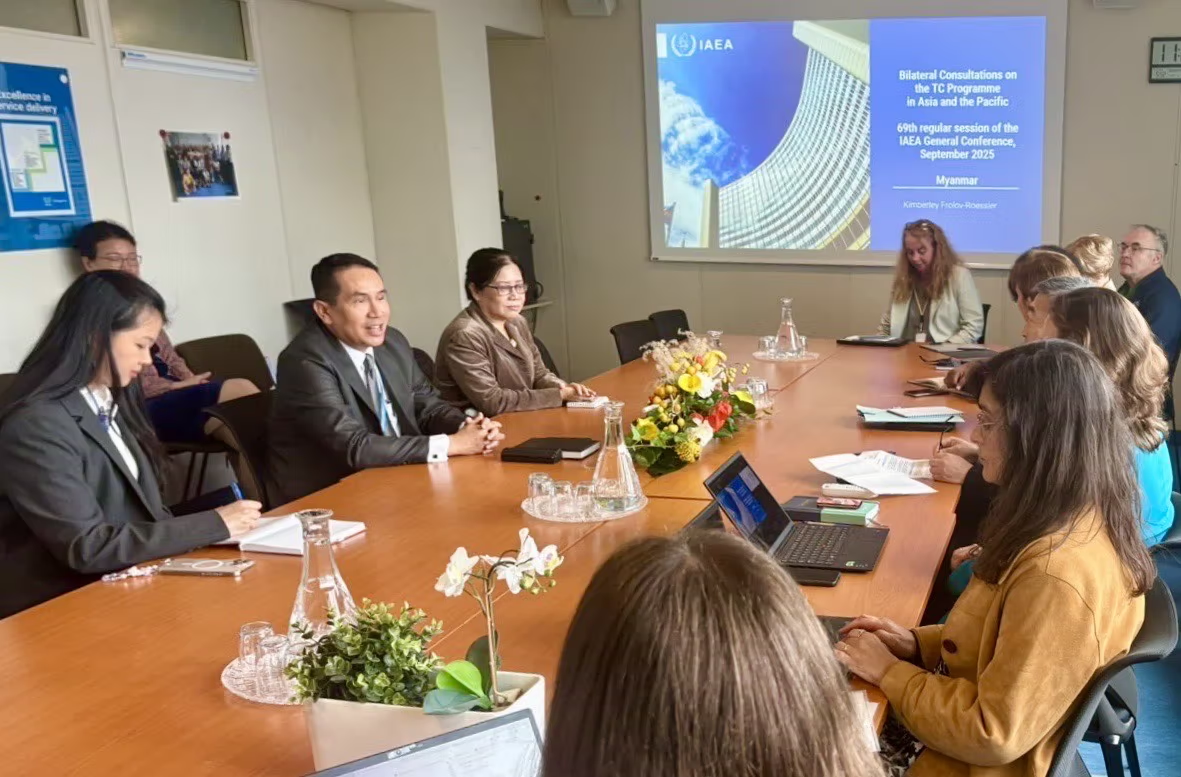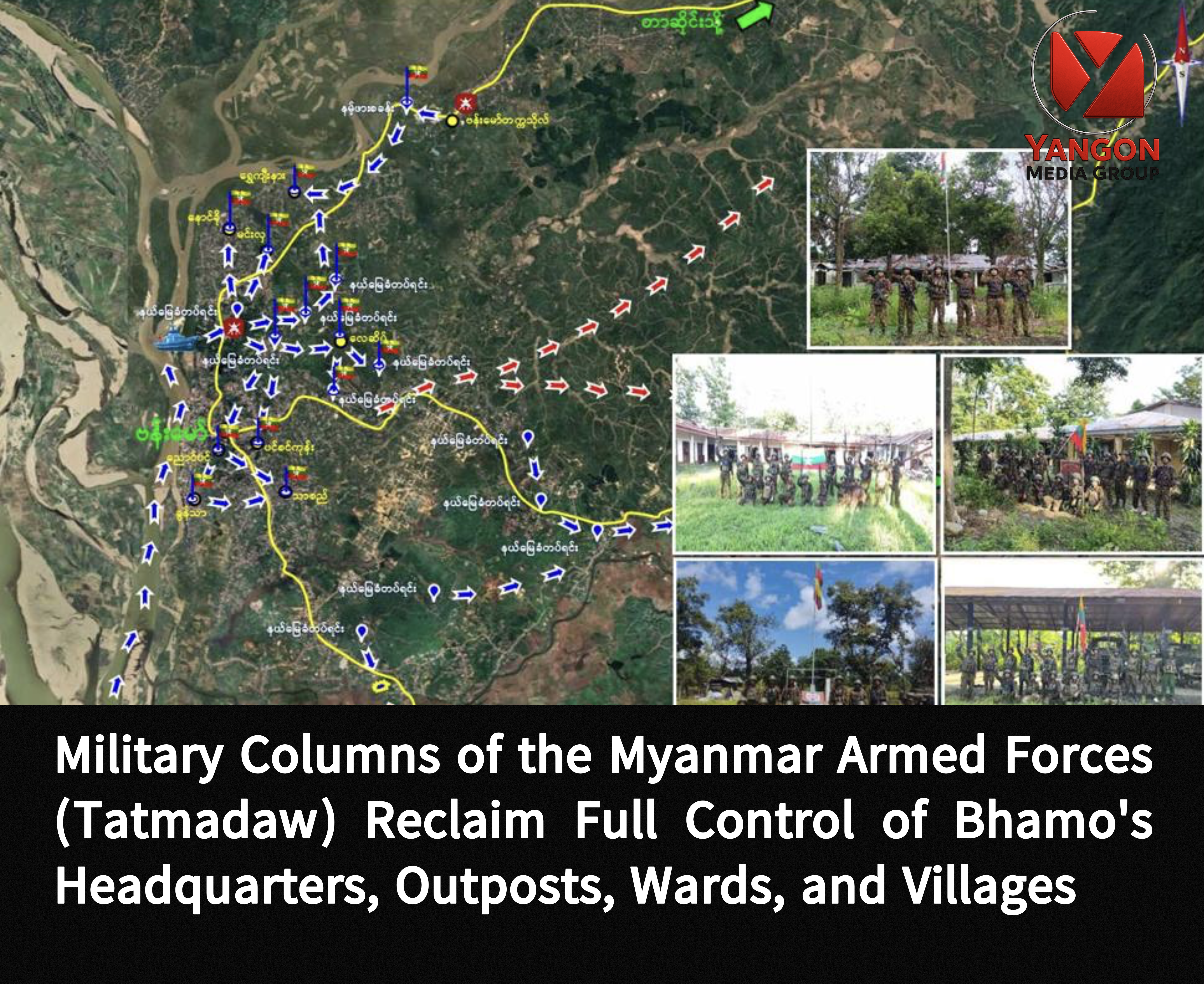
NAY PYI TAW, September 23, 2025 — Myanmar's acting President and Chairman of the State Security and Peace Commission, Senior General Min Aung Hlaing, is set to pay a friendly visit to the Russian Federation in the coming days. The trip comes at the invitation of Russian President Vladimir Putin.
According to a government press release, the Senior General will attend the World Atomic Week Forum - 2025, which will be held in Moscow.
During his visit, the Senior General will meet with President Putin and other Russian officials. The agenda includes discussions on strengthening and enhancing cooperation in various sectors, including diplomatic relations, trade, security, and strategic partnerships between the two governments and their peoples.
Senior General has visited Russia at least five times since 2021.
#ymg/knl

NAY PYI TAW, Myanmar – September 23, 2025
The Union Solidarity and Development Party (USDP) will contest the upcoming 2025 multi-party general election with the highest number of candidates, according to a statement from the Union Election Commission (UEC).
The UEC released a statement today, September 23rd, detailing the list of political parties and independent candidates who have registered to compete in the election scheduled to begin on December 28, 2025. The data reveals that the USDP has fielded the most candidates across all levels of parliament.
Among the parties competing at the Union level, the USDP stands at the top with a total of 1,018 candidates.
The National Unity Party follows with the second-highest number of candidates at 694, while the People's Pioneer Party is third with 672 candidates. The Shan and Nationalities Democratic Party will field 584 candidates, the People's Party 512, and the Myanmar Farmers' Development Party 428, according to the announcement.
A total of 4,963 candidates, including representatives from 57 political parties and independent candidates, have submitted their names to run for office.
The UEC also stated that the respective sub-commissions are currently in the process of vetting the submitted lists of candidates.
#knl/ymg

YANGON, Sept. 22 (Xinhua) -- The National Theatre of Yangon came alive over the weekend, its grand hall brimming with color, music, and applause as audiences experienced Wu Opera, a centuries-old art form from China's Zhejiang Province.
The performance was staged to celebrate the 76th anniversary of the founding of the People's Republic of China and the 75th anniversary of China-Myanmar diplomatic relations.
More than 2,000 people attended the event on Saturday and Sunday. For many in the audience, it was their first time experiencing Wu Opera. Among them was Lwin Phyo Hein, a second-year student at the National University of Arts and Culture in Yangon. He said the opera's acrobatic flips left a strong impression.
He added that the live experience was far more vivid than watching online. "Costumes are excellent. I recommend it to my friends," he said, saying that cultural exchanges allow countries to share traditions and build stronger connections.

Artists of a Wu Opera troupe from east China's Zhejiang Province perform at the National Theatre of Yangon in Myanmar, Sept. 20, 2025. (Xinhua/Myo Kyaw Soe)
Daw Thandar Aung, a 26-year-old lecturer at the University of Yangon, attended with four colleagues. She said she was delighted to see Sun Wukong, the Monkey King, come to life on stage, and it was her first time seeing the character outside of television.
She also praised the organizers for providing translations that made the performance easier to follow. "This performance not only entertains but also strengthens China-Myanmar relations," she said.
Nway Hnoung Shar, a 25-year-old teacher at the Myanmar International Education Center, said the opera reminded her of characters she had read about in books, describing it as an inspiring cultural exchange.
She emphasized that such performances let young people from Myanmar experience the cultures of both countries without the need to travel. "The opera is entirely new to me. It is excellent," she said.
Chinese Ambassador to Myanmar Ma Jia said during the performance on Saturday that this year marks the 75th anniversary of the establishment of diplomatic relations between China and Myanmar. Over the past 75 years, the two nations have been bound by the deep-rooted "Paukphaw" (fraternal) friendship. The close exchanges in culture, art, education, media and other fields have helped to build a solid "bridge of hearts" between the two peoples.
"I believe that today's brilliant performances by artists of both countries will not only let us appreciate the unique artistic charm of traditional operas but also offer us a rare chance to witness shining on each other and prospering together through dialogue and exchange of ancient civilizations," she added.
Myanmar's Union Minister for Information U Maung Maung Ohn said, "It is a great honor and joy for Myanmar audiences to witness the performances of this famous troupe here today."
He added that cultural exchanges and mutual learning between Myanmar and China deepen the friendship between their peoples and strengthen relations at the national level.

On Saturday, the Zhejiang troupe performed six classic pieces, including "Lyu Bu Tries the Horse," "The Goddess of Heaven Scatters Flowers," and "Three Triumphs Over the Skeletal Demon."
Myanmar performers also contributed two pieces excerpted from the Ramayana classic play, "Rama Pursuing the Enchanted Golden Deer" and "Sita's Rejection of Dasagiri Courtship."
In addition, cultural booths hosted by the China Cultural Center in Yangon and the State High School of Arts in Yangon gave visitors hands-on experiences of Chinese and Myanmar arts and crafts, complementing the performances on stage.
Wu Opera, also known as Jinhua Opera, is the second major theatrical genre in Zhejiang Province, eastern China, and has a history of more than 500 years. It got its name from Wuzhou, the ancient name of Jinhua, and remains very popular there. In June 2008, Wu Opera was listed as a National Intangible Cultural Heritage.■
#Xinhua

NAY PYI TAW, September 21, 2025- According to a news release, a member of Myanmar's State Security and Peace Commission and Union Minister for Defense, General Maung Maung Aye, recently visited several advanced military technology companies in Beijing, People's Republic of China.
The news release stated that on the evenings of September 18 and 19, Defense Minister General Maung Maung Aye toured the Beijing-based companies and observed the production of unmanned aerial vehicles, aerospace technology components, and electronic warfare and air defense technology. He also discussed potential technological cooperation with company officials.
The delegation led by General Maung Maung Aye made these visits while attending the 12th Beijing Xiangshan Forum.
It was also reported that on the afternoon of September 17, General Maung Maung Aye met with Admiral Dong Jun, China's Minister of National Defense, at Beijing's Bayi Hall. The two officials had a candid and open exchange of views on a range of topics, including enhancing cooperation in various sectors of defense, maintaining stability and the rule of law in border regions, strengthening military technology collaboration, sending trainees for military training, and further solidifying the close familial ties between the two nations.
#ymg/knl

NAY PYI TAW, September 20, 2025 - A Myanmar delegation met with senior officials from the International Atomic Energy Agency (IAEA) on September 18 in Vienna, Austria, to discuss nuclear technology assistance programs for Myanmar.
According to a press release from the Myanmar Ministry of Foreign Affairs, the meeting took place during the IAEA's 69th General Conference. The Myanmar delegation, led by Ambassador U Min Thein, Permanent Representative of Myanmar to the UN and other international organizations in Vienna, and Dr. Theingi Maung Maung, Director-General of the Department of Atomic Energy under the Ministry of Science and Technology, met with a team led by Mr. Ge Deng, Director of the Division for Asia and the Pacific, Department of Technical Cooperation at the IAEA. The meeting was held at 11:30 AM on September 18, 2025, at the Vienna International Centre.

During the meeting, they discussed the progress of the technical assistance programs for Myanmar under the current 2024-2025 cycle.
In the afternoon of the same day, the Myanmar delegation also met with a team led by Ms. Liliya Dulinets, Head of the Nuclear Infrastructure Development Section, Department of Nuclear Energy at the IAEA. The discussion focused on obtaining regulatory and technical assistance for the development of Myanmar's nuclear energy infrastructure.
These meetings took place as Myanmar is undertaking initial activities to develop its nuclear energy sector.
#knl/ymg

NAY PYI TAW, Myanmar (September 19, 2025)-In a significant diplomatic gesture, Timor-Leste has pledged to the Myanmar government that it will not allow organizations opposing the government to open offices or conduct illegal protest activities within its borders. The promise was made by Mr. Bendito dos Santos Freitas, Timor-Leste's Minister of Foreign Affairs and Cooperation, during a working visit to Myanmar's capital.
The commitment was reportedly given to Myanmar’s Foreign Minister U Than Swe on September 18, according to an official press release from Myanmar’s Ministry of Foreign Affairs. The statement also noted that Minister Freitas extended an invitation for Myanmar to open an embassy in Dili, the capital of Timor-Leste.
During the meeting, the two foreign ministers emphasized their shared commitment to enhancing diplomatic relations based on the principles of the ASEAN Charter. They agreed to bolster ties while strictly adhering to the principle of non-interference in each other’s internal affairs.
Discussions also included potential agreements to boost cooperation, such as a visa exemption agreement for diplomatic and special passport holders and a separate visa exemption agreement to promote tourism between the two nations.
Minister Freitas and his delegation were in Myanmar for a working visit from September 17 to September 19, 2025.
#knl/ymg

Naypyidaw—September 12, 2025: The Myanmar Armed Forces (Tatmadaw) has announced it has fully regained control of military headquarters, outposts, wards, and villages in and around Bhamo town, which were temporarily held by KIA , AA and PDF terrorist insurgents.
Following the recapture, the Tatmadaw's information team stated that the insurgents suffered heavy casualties and are retreating in disarray towards the northeast of Bhamo and to Momauk, where their main forces are located.
According to the statement, military naval vessels carrying reinforcement troops proceeded to Bhamo in August 2025. Despite various difficulties and blockades by the insurgents—which damaged two push boats along the way—the vessels successfully arrived. From August 4, 2025, seven military columns were formed to advance.
One of the columns marched from the Bhamo University area northeast of the town and captured a camp at Nampha village before continuing its advance toward Bhamo.
Another column advanced from the north of Bhamo, securing the Naung Kho and Min Hla wards. Meanwhile, three columns from the east captured four local military headquarters, one outpost, and the airport area, which had been temporarily held by the insurgents.
The advancing columns then launched a two-pronged counter-offensive, while two additional columns intensified their counter-attacks in the Pin Hsin Kone, Nyaung Pin, Khun Tha, and Thar Si wards, including the area known locally as Kachin Su.
From December 4, 2024, to September 11, 2025, there were 16 major battles and 490 skirmishes with the terrorist insurgents. During these engagements, the Tatmadaw seized 163 bodies, 178 assorted weapons, and related equipment.
The statement also reported, based on separate news sources, that the combined insurgent groups suffered approximately 4,616 deaths and 4,983 injuries in these battles due to the military's valiant counter-attacks. The Tatmadaw, for its part, also lost some officers and soldiers who made the ultimate sacrifice for the state and the armed forces.
The statement noted that due to their heavy casualties, many insurgents are surrendering to the Tatmadaw's columns with their weapons, ammunition, and other related items.
The Tatmadaw's columns will continue to clear the remaining terrorist insurgents from within Bhamo town, the statement concluded.
#ymg/knl